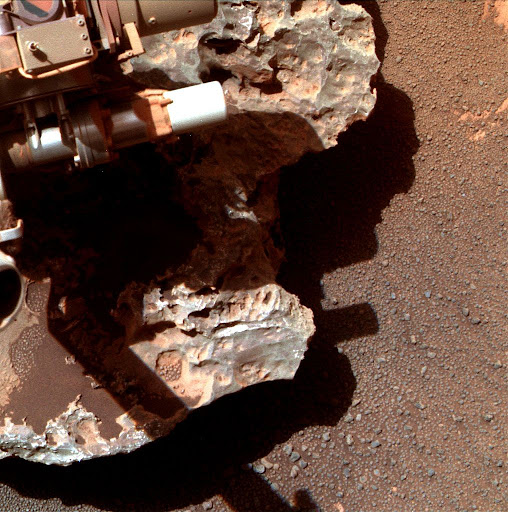New Mars Forums
You are not logged in.
- Topics: Active | Unanswered
Announcement
#26 Re: Pictures of Mars » Color images of Mars from the Spirit and Opportunity rovers » 2012-11-02 16:36:06
Rxke I agree.
Curiosity wheels are made out of aluminum, it looks like the wheels weren't worked hardened and shotpeened during processing. Curiosity weighs 899 kg (1,980 lb) on earth but on Mars it weight is 342 kg (752.4 lb) still a lot of weight that is applied to the aluminum wheels. If those wheels aren't processed the right way which is easily checked by a Rockwell hardness tester and eddy current then they may be much softer wheels than NASA ordered.
Ron Bennett
#27 Re: Pictures of Mars » Color images of Mars from the Spirit and Opportunity rovers » 2012-11-01 01:44:09
Is Curiosity wheels going to hold up to get to Mount Sharp that's the 2.5 billion dollar question after looking at the dings in the wheels here:
sol 84



#28 Re: Pictures of Mars » Color images of Mars from the Spirit and Opportunity rovers » 2012-10-31 12:57:24
Rxke
Thanks that is why I sharpened and added more contrast to the dull looking JPL images.
Here is something we may see more often, look at the circled item it looks like a dust particle on the lens, several images have the small dark spot at the same location.

Here is an enlarged look at the dust particle.

It will be interesting to see how long it stays on the lens, since the vibration from the movement of the rover should dislodge it.
#29 Re: Pictures of Mars » Color images of Mars from the Spirit and Opportunity rovers » 2012-10-30 01:28:25
Rocks at Curiosity Rocknest sol 80-82, I sharpen and add contrast to JPL's Images from Curiosity


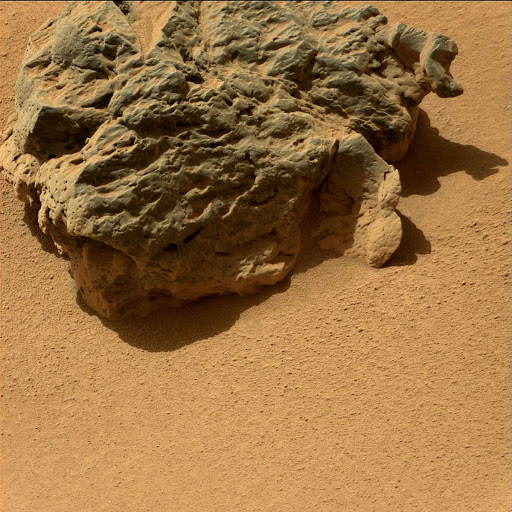
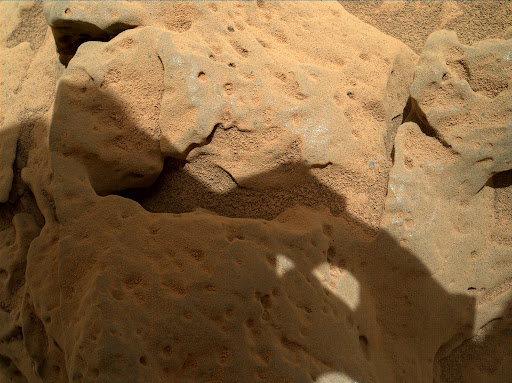





#30 Re: Pictures of Mars » Color images of Mars from the Spirit and Opportunity rovers » 2012-10-27 01:52:44
New images of rocks from the forgotten Rover, Opportunity, at Endeavour Crater.



#31 Re: Pictures of Mars » Color images of Mars from the Spirit and Opportunity rovers » 2012-10-19 00:36:27
"Is there any chance it could be organic? Windblown from some distant warm water pool?"
Dunes anybody.
Who knows some water based life form not use to the martian atmosphere would boil and explode then dry out once it comes in contact with the surfaces if dug up from a pressurized subsurface, a good example is how it was portrayed in Total Recall? Here on earth ice worms that live on top of mountain glaciers that have antifreeze inside them live in ice up to 3 feet below its surface, the worms melt and die from the warmth of people's hands when they hold them without gloves, their used to much lower temperatures. It's a very-long shot but it can happen. It kind of looks like a shredded skin from a snake or a worm, now that would be a site to see some snakes slithering around the rover.
On another note, it is good that they are going to zap the bright object they just found, on 10/13/2012 of this blog I suggested to do the same thing, see the last several images. We will have a control test that they can calibrate their laser spectro to if they know what type of material the bright plastic worm-like object was and zap that too.
#32 Re: Pictures of Mars » Color images of Mars from the Spirit and Opportunity rovers » 2012-10-15 00:45:46
Who knows they claim Mars had standing water in that area for millions of years. Here on earth sea creatures were swimming in the sea for over 3.8 billion years, the atmosphere on the surface of earth was too toxic for any land creature until 700 million years ago...
#33 Re: Pictures of Mars » Color images of Mars from the Spirit and Opportunity rovers » 2012-10-14 02:00:12
Here is another bright object in the trench dug by Curiosity imaged by its Hand Lens Imager (MAHLI) images for Sol 67. Ha, maybe Curiosity is at an old Martian dump site?


#34 Re: Pictures of Mars » Color images of Mars from the Spirit and Opportunity rovers » 2012-10-14 00:50:20
One thought that occurred to me is that what better way to test some of the equipment out, than to do it on an object we built ourselves, by knowing what the composition of that object is we can calibrate our equipment. One way would be to use the laser to heat-up the bright object that supposedly fell from the sky from the descent of the MLS and see how it reacts to the Martian environment and what spectrum comes out of it, in the process clean up some of our garbage by doing this. On earth we can do the same thing with like equipment and compare notes.
#35 Re: Pictures of Mars » Color images of Mars from the Spirit and Opportunity rovers » 2012-10-14 00:42:07
"is Mars now being contaminated with "LIFE" from Earth from the rovers and "debris" from the Rovers? seems likely!!"
It is very likely, we may have started terraforming Mars with life over thirty years ago. We can go way back to the Viking Landers and say the same thing, most things back then weren't as rigorously cleaned of all life forms on earth before launch as the newer Landers and Rovers. With that being said no object can be uncontaminated 100 percent. Some of these microscopic extromphiles that live on earth can survive the trip to Mars and the rigorous process to kill them off before launch.
#36 Re: Life on Mars » The Phoenix Lander found life on Mars » 2012-10-14 00:34:36
One thought that occurred to me is that what better way to test some of the equipment out, than to do it on an object we built ourselves, by knowing what the composition of that object is we can calibrate our equipment. One way would be to use the laser to heat-up the bright object that supposedly fell from the sky from the descent of the MLS and see how it reacts to the Martian environment and what spectrum comes out of it. On earth we can do the same thing with like equipment.
#37 Re: Life on Mars » The Phoenix Lander found life on Mars » 2012-10-12 22:15:22
New close-up image of bright spot, looks like someone on Mars tried to roll a joint???

#38 Re: Pictures of Mars » Color images of Mars from the Spirit and Opportunity rovers » 2012-10-12 22:12:04
Looks like someone tried to roll a joint.
Curiosity sol 64

#39 Life on Mars » Martian like life at Africa gold mine and Blood falls Antarctica. » 2012-10-10 19:39:24
- mars-images
- Replies: 0
"Bacteria That Make Magnetite
The samples collected in Virginia in 1993 contained micron-sized bacteria and nanometer (nm)-sized particles of magnetic iron in what Phelps calls "their bug poop." Phelps brought the samples back to ORNL. He and his ESD colleagues Chuanlun Zhang and Jizhong Zhou later purified the samples, isolated a strain of bacteria they named TOR-39, and showed that these anaerobic (non-oxygen-breathing), rod-shaped extremophiles can convert iron hydroxide to magnetic iron, or magnetite."
http://www.ornl.gov/info/ornlreview/rev32_3/amazing.htm
See here the similarities between TOR 39 Bacteria, Phoenix Lander site, Viking Lnaders site, and Alan Hill meteorite AH84001:

"Blood Falls is an outflow of an iron oxide-tainted plume of saltwater, occurring at the tongue of the Taylor Glacier onto the ice-covered surface of West Lake Bonney in the Taylor Valley of the McMurdo Dry Valleys in Victoria Land, East Antarctica.
According to Mikucki et al. (2009), the now-inaccessible subglacial pool was sealed off 1.5 to 2 million years ago and transformed into a kind of "time capsule," isolating the ancient microbial population for a sufficiently long time to evolve independently of other similar marine organisms.
According to geomicrobiologist Jill Mikucki at Dartmouth College, water samples from Blood Falls contained at least 17 different types of microbes, and almost no oxygen.
An explanation may be that the microbes use sulfate as a catalyst to respire with ferric ions and metabolize the trace levels of organic matter trapped with them. Such a metabolic process had never before been observed in nature."
#40 Re: Pictures of Mars » Color images of Mars from the Spirit and Opportunity rovers » 2012-10-10 19:15:16
Here is a YouTube time lapse movie of Curiosities shovel shaking up some Martian sand
#41 Re: Life on Mars » The Phoenix Lander found life on Mars » 2012-10-09 02:04:28
Here on earth there are typically 40 million bacterial cells in a gram of soil and a million bacterial cells in a millilitre of fresh water; in all, there are approximately five nonillion (5×1030) bacteria on Earth, forming a biomass that exceeds that of all plants and animals.
Some bacteria do grow larger than 0.7 mm like the E. fishelsoni and the collodictyon which date back over 3.7 billion years ago is the size of one of those moving life-like objects. There are several reasons I think this could be life. Water ice was first verified at the Phoenix Lander, subsurface life would be under pressure therefore trapped water vapor and gas can make the pressure much higher just below the surface where water would form during a certain time of day and season. Extemophiles like Tardigrades can survive the vacuum of space, thousands of times more radiation than humans can in a suspended animation type cocoon called a tune and live years without water. These life like objects would be like fish out of water when first dug up.
With that being said look what I found at Curiosity sol 62 looks like a worm that was just dug up by the shovel they used to dig up some sand???

#42 Re: Pictures of Mars » Color images of Mars from the Spirit and Opportunity rovers » 2012-08-06 23:16:42
Feel free to comment here because I can update new images on the first 11 post without disrupting the discussions after it, thanks
Ron
#43 Life on Mars » The Phoenix Lander found life on Mars » 2012-07-11 02:40:59
- mars-images
- Replies: 8
There is life on Mars and it was there when the Viking Lander dug it up and more recently when the Phoenix Lander dug it up. See this 6 minute video and pay close attention to the ending...
Here are the youtube location
Mars Life Found
Microscopic Life Found on Mars
Here is a chart about the similarities between Viking, I, II, Phoenix Lander, TOR-39 - a extremophile microbe living 2 miles down in a South African gold mine, and Allen Hill 84001 meteorite.

Here is one of the time lapse images taken of an extremophile like object with a scorpian-like tail moving around in the Phoenix Landers microscopic imager. Have fun:
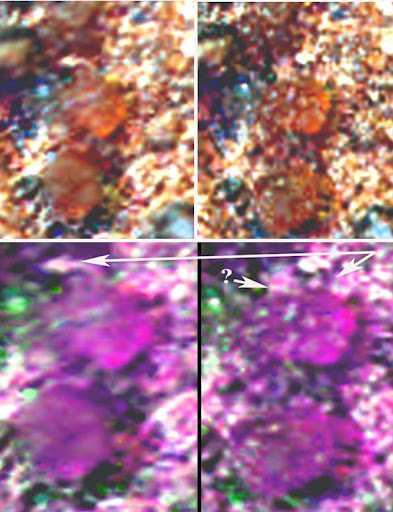
#44 Re: Pictures of Mars » Color images of Mars from the Spirit and Opportunity rovers » 2012-01-29 22:06:42

Mars Endeavour, looking in from the rim.
1P380945838EL5M1
#45 Re: Pictures of Mars » Color images of Mars from the Spirit and Opportunity rovers » 2011-12-28 03:34:56
1P383333015EL5M1
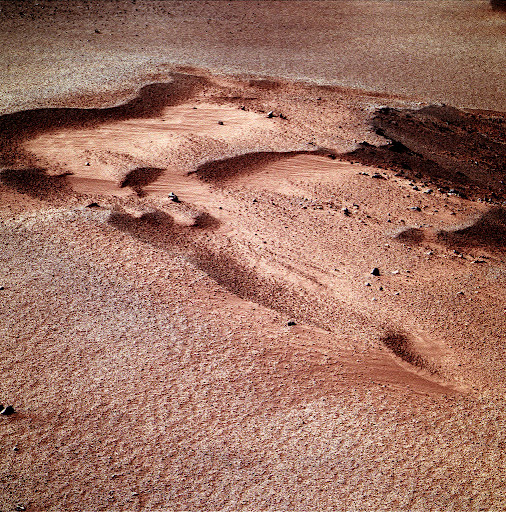
Updated 02/25/2012
#46 Re: Pictures of Mars » Color images of Mars from the Spirit and Opportunity rovers » 2005-10-23 19:13:10
#47 Re: Pictures of Mars » Color images of Mars from the Spirit and Opportunity rovers » 2005-10-19 21:44:11
Block Island Meteor

#48 Re: Pictures of Mars » Color images of Mars from the Spirit and Opportunity rovers » 2005-10-16 10:06:33
Block Island Meteor

#49 Re: Pictures of Mars » Color images of Mars from the Spirit and Opportunity rovers » 2005-10-12 12:57:39
Block Island Meteor
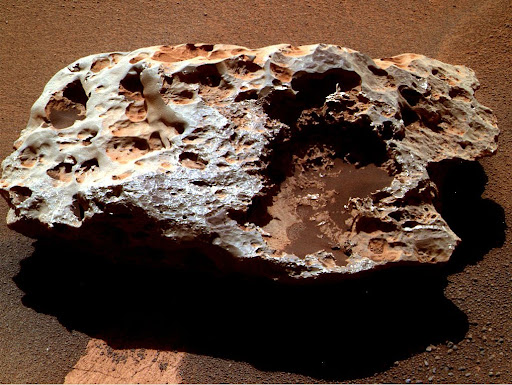
1P302273177EL5M1.jpg
#50 Re: Pictures of Mars » Color images of Mars from the Spirit and Opportunity rovers » 2005-10-10 09:18:22
Mt Sharp colorized from
Raw image sol 12 08-18-2012

1P338406501EL5M3.jpg
